

HELPING PEOPLE HEAL
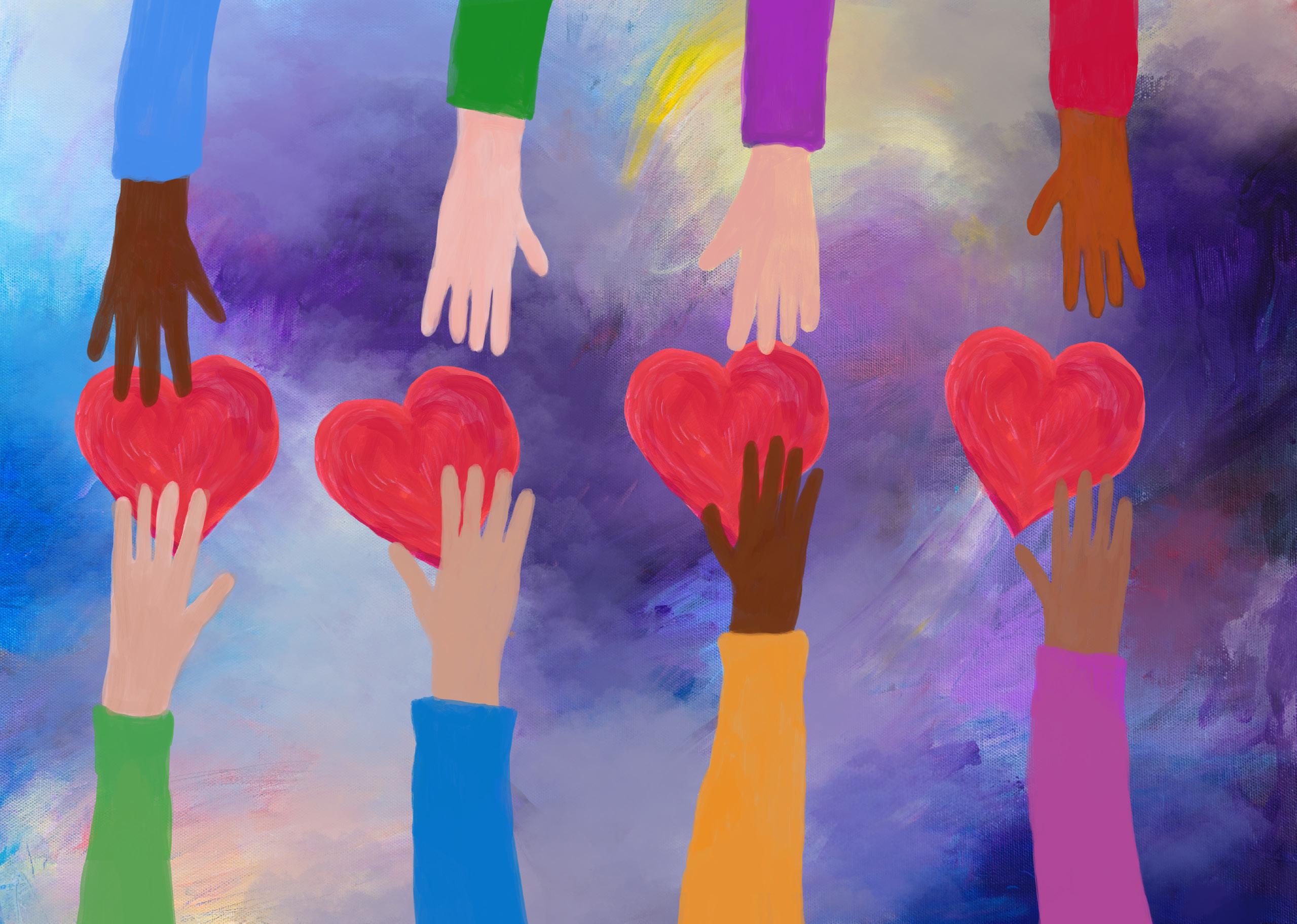
Board Members
Dawn Gilman, Chair
Chief Executive Officer
Changing Homelessness
Dr. Vicky Basra
President & CEO
Delores Barr Weaver Policy Center
Lisé Everly Community Leader
The Hon. Denise R. Ferrero Circuit Court Judge Eighth Judicial Circuit
Jennifer Gulino
Consumer Family Representative
Jennifer Martinez
Executive Director, Marion Senior Services
Shawna Novak
Director, Health & Human Services CEO, Family Integrity Program
St. Johns County Board of County Commissioners
Ofir Pizanti
Consumer Youth Representative
Idit Pizanti
Parent/Family Representative
Peggy Schiffers
Community Leader
Dr. Waqas Ahmed
Founder / CEO
American TelePhysicians
T.K. Waters
Sheriff
Jacksonville Sheriff’s Office
Message from Our CEO
Dr. Christine Cauffield
Dear Friends,
Several important recent events have illuminated the crucial role of managing entities in Florida. I’m thrilled to share some of these initiatives with you in this report to our stakeholders.
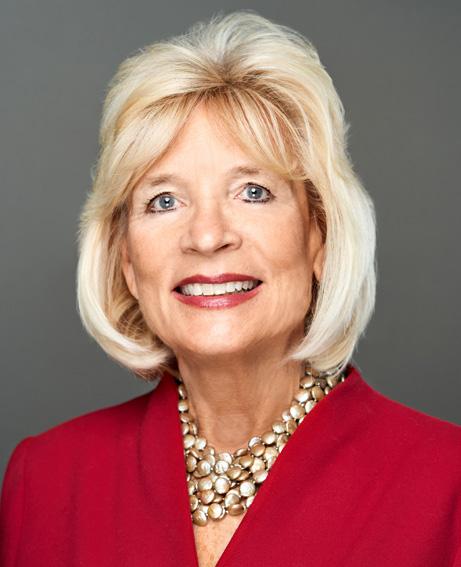
Stories featured in this publication highlight the role LSF Health Systems plays in implementing Florida’s CORE initiatives, as well as how we partner with counties to manage the opioid lawsuits settlement funds, illustrating the critical role of communitybased care through managing entities.
The articles demonstrate how important it is for officials in Tallahassee to have regional resources that understand and work closely with partners and providers in our unique communities around the state.
When Gov. DeSantis created the state’s Coordinated Opioid Recovery (CORE) initiative, Florida’s managing entities provided an existing, proven statewide provider network with decades of experience working with individuals who live with opioid use disorders and other substance use challenges, enabling us to efficiently expand the CORE network into new counties while maintaining fidelity to the CORE model. Our relationships with communities and providers allowed Florida’s Department of Children and Families to rely on LSF Health Systems to provide technical and administrative assistance to 19 counties to aid them in deploying opioid settlement funds in accordance with settlement requirements to support local efforts to abate the opioid crisis.
As this report celebrates, Florida is a national, and indeed international, leader in how we manage community-based, integrated behavioral healthcare. We’ve continued to lead in this area, with a focus on providing innovative, best-practice and evidence-based services.
I’m proud to serve on an international panel for the European Community-based Mental Health Service Providers (EUCOMS) Network. EUCOMS is working to reform how mental health services are delivered in Europe. I was invited to serve on EUCOMS in part because of the best-practice programs and community based systems we’ve developed in Florida.
Seeing first-hand how others try to replicate our innovation and our results, I’m so proud of the model we have in our state. The managing entity model was designed for agile, innovative responses to today’s – and tomorrow’s – most challenging behavioral health problems. It addresses the unique needs of every county served in Florida.
We’re thankful to the forward-thinking legislative leaders who decided to privatize the behavioral health system: moving from centralization to community-based care.

Dr. Christine Cauffield, CEO, LSF Health Systems
Our Vision
We envision communities where every child, adult, and family has access to the behavioral health care services they need to live well and be well.
Our Mission
Our mission is to develop and sustain an integrated system of behavioral health care through a network of services built on integrity, innovation, and collaboration.
Florida’s CommunityBased Care Model Marking Significant Milestones
Florida has led the nation in restructuring and improving its former centralized behavioral health system to a robust community-based care model.
The state’s community-based care system has evolved to a model studied and copied around the world.
Florida’s private, regional nonprofit managing entities provide an innovative, best practice system of care as well as incredible return on investment for the state’s taxpayer dollars.
“What we accomplished in Florida, by implementing an effective community-based care system for behavioral health, had never been done before,” said Dr. Christine Cauffield. “We created a model that is admired around the nation and indeed the world for its effectiveness, its accountability and its responsiveness to citizens’ needs.”
In its regional service area, LSF Health Systems promotes and supports the development of holistic, innovative and evidence-based programs within a strength-based, recovery-oriented system of care. The regional network consists of more than 95 behavioral health organizations that provide a comprehensive range of mental health, substance use, and primary care services for uninsured children, adults and families who lack financial resources to afford care. The organization’s goal is to ensure that every child and adult in need receives the right service at the right time, and in the right setting.
Private providers in LSF Health System’s network care for special populations that include:
• chronically homeless individuals
• families in the foster care system
• individuals with serious mental illness
• injecting drug users
• older adults
• veterans
• women who are pregnant
• youth in the juvenile just system
• individuals with substance use disorder that live with HIV
The managing entity model is community-based, relying on regional and local nonprofit organizations to help build consensus, encourage collaboration, expand the use of data to drive decision making, implement best practices, focus more on community needs and save
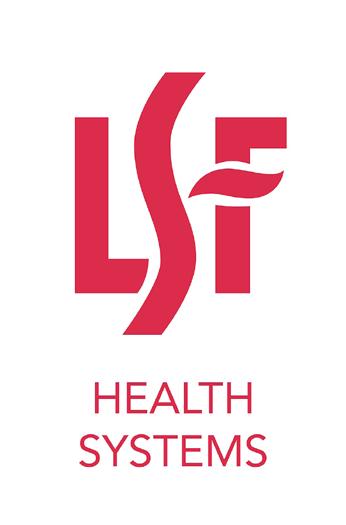
As one of Florida’s seven private, nonprofit managing entities, LSF Health Systems manages state-funded behavioral health services in a 23-county area.
significant taxpayer funds. LSF Health Systems reports to the Department of Children and Families and subcontracts with local providers in our communities we serve in north central and northeast Florida.
Results the system has produced are clear. Florida’s community-based care model has made great strides in system improvements and measured outcomes. The managing entity system has increased innovation and capacity building while substantially reducing administrative and overhead costs, among other improvements, according to a report from the independent government watchdog group Florida TaxWatch.
A BROAD SPECTRUM WITH A COMMUNITY FOCUS Decades after Florida’s innovative reform effort, other states across the nation continue to grapple with how to best manage and account for public funds while ensuring quality services for growing and needy populations. The model our state developed provides a solid platform for integration of behavioral and primary healthcare.
“Managing entities ensure that the system of care is available and accessible when needed,” Cauffield said. “We support prevention, intervention, crisis support, opioid addiction recovery, medication-assisted treatment, residential treatment, and outpatient services for adults, children, and families. There are no other entities in the state that can accomplish these vital services with the level of professionalism and accountability that we do.”
Background and content from Florida TaxWatch’s 2015 report “Analysis of Florida’s Behavioral Health Managing Entity Model” is used in this article.
LSF Health Systems Managing Millions in Florida’s Opioid Lawsuit Settlement Funding
Counties across the state expect to receive more than $3.2 billion in funding from opioid lawsuit settlements during the next 17 years. LSF Health Systems and other managing entities are playing an important role in helping to ensure that funding has the greatest possible impact on the opioid crisis.
The funding that LSF Health Systems is managing supports “non-qualified counties” with populations of less than 300,000 and is in addition to millions more the state is allocating to larger counties in LSF Health Systems’ service area covering Northeast and North Central Florida.
Florida counties across the state will receive more than $3.2 billion in settlement funding during the next 17 years from a 2018 lawsuit the state filed against 11 corporations for their role in the opioid epidemic crisis. Florida will also receive $84 million in funding for the overdose reversal drug Naloxone.
providers in these counties. We brought them in and helped them understand how to get past administrative barriers so they could begin implementing great ideas in their communities.”
“The state faced a Herculean task of figuring out how to effectively administer the settlement funding to produce the best possible outcomes.”
- Dr. Christine Cauffield
Counties elected to use their funds for a variety of efforts including community integrated health/ paramedicine programs to provide a more intensive approach to responding to opioid overdoses. Media campaigns aimed at youth and their parents to warn of the dangers of illicit drugs, such as the One Pill Can Kill campaign were implemented in several counties. Funds were also used to increase access to medication-assisted treatment in communities that have been historically lacking in resources.
“The state faced a Herculean task of figuring out how to effectively administer the settlement funding to produce the best possible outcomes for communities impacted by the opioid epidemic,” said LSF Health Systems CEO Dr. Christine Cauffield. “Managing entities like ours were the perfect solution. We knew the needs of our local communities. We understand which solutions work. And we had the local relationships needed for success.”
As much as 40% of Florida’s total opioid settlement funding is being managed by regional entities like LSF Health Systems, according to Kristine Ferrer Garcia, associate vice president of network management for LSF Health Systems.
In its first year managing the funding, LSF Health Systems reviewed and approved more than $13 million in funding requests from 19 counties including Alachua, Baker, Bradford, Citrus, Clay, Columbia, Dixie, Flagler, Gilchrist, Hamilton, Hernando, Lafayette, Levy, Nassau, Putnam, St. Johns, Sumter, Suwannee and Union.
“The existing relationships we have with the local providers are crucial,” Ferrer Garcia said. “We took it upon ourselves to set up meetings with new
As the number of opioid-related deaths continues to devastate communities across the state, it’s imperative for the settlement funds to be used effectively for life saving prevention and treatment, Cauffield said.
“Our work has begun to turn the tide on the opioid crisis in Florida, but we have more work to do in helping to heal the smaller, rural communities that were often hit hardest by the epidemic,” she said. “LSF Health Systems is uniquely positioned to ensure this funding achieves its maximum potential benefit to those most effected.”
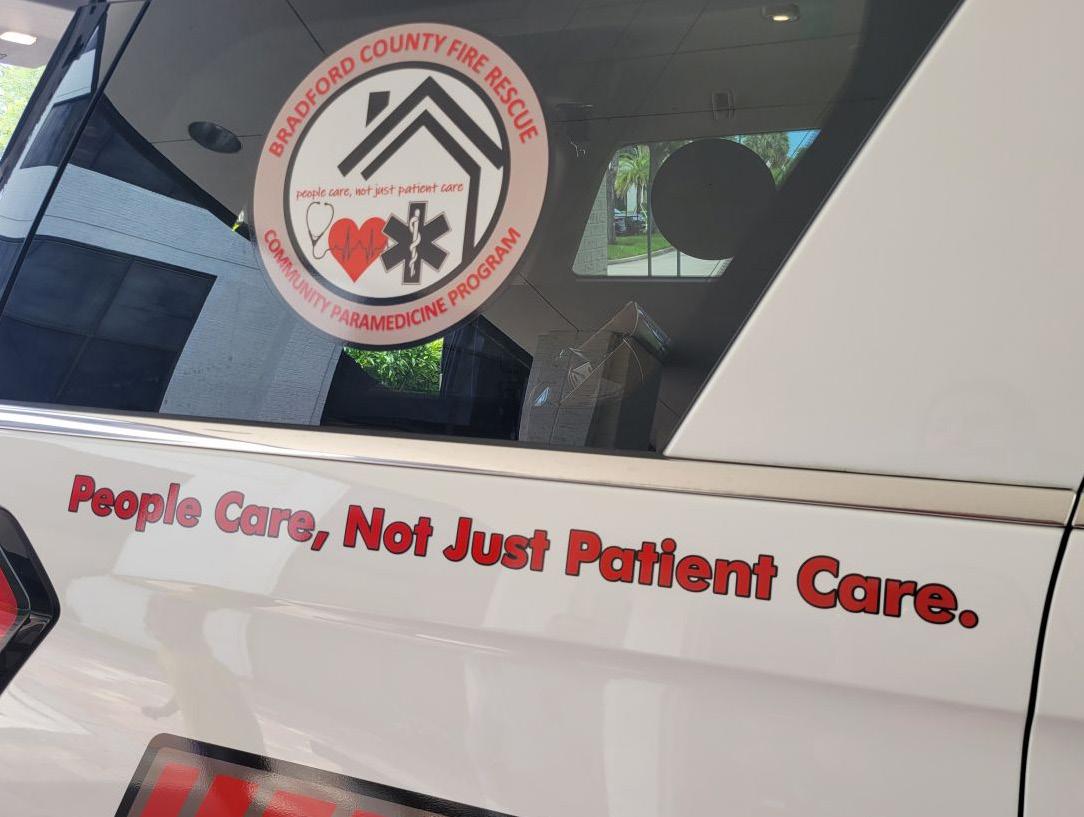
Citrus Lake
Fighting The Epidemic
LSF Health Systems Playing a Crucial Role in State’s New CORE Network Initiative
Florida’s CORE initiative is a comprehensive, coordinated response to opioid use disorder and opioid overdoses. The network provides an immediate, 24/7 response as well as connection to treatment and peer recovery support services.
LSF Health Systems is playing a crucial role in helping establish more than $10 million in prevention and intervention programs like these in eight of the counties in its 23-county service area, according to Kristine Ferrer Garcia, associate vice president of network management for LSF Health Systems.
The funding, from opioid lawsuit settlements, is being administered and distributed by the agency as part of the state’s Coordinated Opioid Recovery (CORE) initiative.
LSF Health Systems was initially tasked in FY 2023-24 with reviewing proposals and distributing $6.5 million to six CORE network counties including Duval, Clay, Flagler, Marion, Citrus and Volusia. Hernando and Lake were added later.
The agency expects to allocate almost $4 million to programs in these counties during FY 2024-25 and is anticipating the possible addition of an additional six counties in the latter half of the 2024-25 fiscal year.
This year, CORE emergency response teams responded to an unprecedented 62,210 dispatches for substance use disorders and opioid use disorders, according to Dr. Matt Munyon, senior director of data analytics and evaluation for LSF Health Systems.
The foundation of the CORE networks is an innovative integrated system of care that connects first responders, hospital ERs and substance use disorder counselors in a first-of-its-kind comprehensive program.
Specially trained certified peer specialists deploy to CORE emergency departments to meet with individuals who have substance use disorder, connecting them to lifesaving community-based care.
“We support the whole network of care, Ferrer Garcia said. “We have fire and rescue departments in each county involved. They administer life-saving tactics then link patients to service providers we are funding and supporting.”
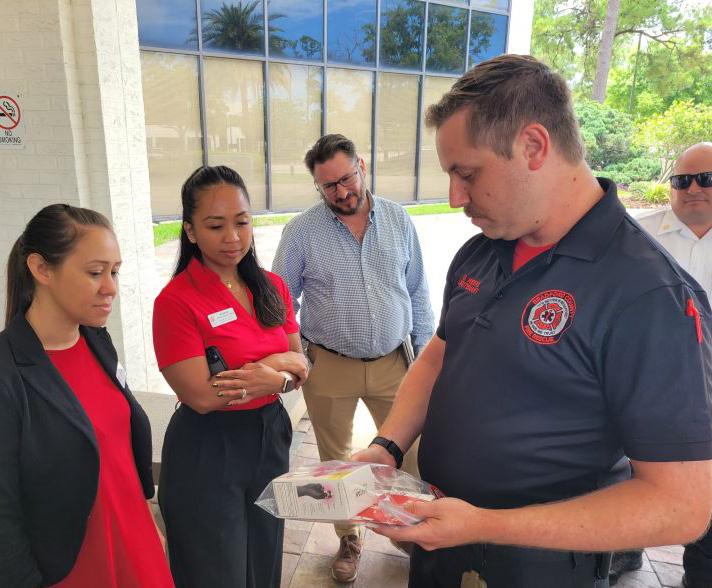
CORE EMS and community partners provide medication assisted treatment in CORE communities where the individual lives, removing transportation barriers for individuals who desperately need care.
LSF Health Systems staff members Princess Bartolazo, Kristine Ferrer Garcia, and Matt Munyon with officers in Baker County discussing the supply of Narcan kits for responding to overdoses.
LSF Health Systems was tasked in FY 2023-24 with reviewing proposals and distributing $6.5 million to Citrus, Clay, Duval, Flagler, Hernando, Lake, Marion, and Volusia Counties.
LSF Health Systems’ Peer Program Guides Veterans to Recovery
Florida is home to the third largest veteran population in the country. These 1.4 million men and women are our neighbors, teachers, first responders and retail workers, but many are also quietly battling mental health challenges.

LSF Health Systems supports these brave individuals through its certified recovery peer specialist program, offering mental health counseling through veteran peer specialists who have walked in their shoes and are ready to guide them on the path to healing.
As part of our peer program, LSF Health Systems offers a specific track that’s designed by veterans for veterans. This track addresses unique challenges faced by our military members, such as PTSD, military sexual trauma and reintegration into civilian life. In addition to 65 hours of certification courses, veteran peer counselors complete a 12-month apprenticeship operating in a high demand area as well as 1,000 hours of field training.
“The lived experience of veterans is truly unique and requires a deep understanding that only someone who has been through it can offer,” said Samantha Lawson Davis, senior director of training at LSF Health Systems.
The peer specialist training is open to veterans from all branches of the military. LSF Health Systems knows that the military community is tight knit and only they can truly understand and relate to what one another has experienced. The curriculum specifically addresses their traumas while also integrating general mental health and substance abuse education.
“We also address critical issues like gambling disorders, non-suicidal self-injury and suicidal ideation, ensuring veterans receive the support they need for these oftenoverlooked struggles,” Davis said.
LSF Health Systems Awarded 5-Year Grant To Expand Suicide Prevention Initiative
LSF Health Systems received a five-year, $2 million grant from the federal Substance Abuse and Mental Health Services Administration (SAMHSA) to continue and expand its successful Zero Suicide Initiative that focuses on veterans and adults in underserved and minority populations.
The Zero Suicide Project will expand LSF Health Systems’ 2020 pilot that focused on individuals living in isolation and at risk for domestic violence and hopelessness during the COVID-19 pandemic.
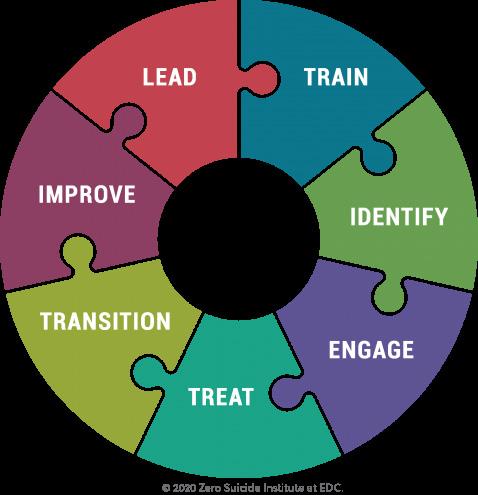
The LSF Health Systems new grant is helping the agency implement the Zero Suicide framework throughout a network of 17 area nonprofit mental health and substance use treatment providers. It includes an integrated system of screening, referral, assessment, gatekeeper training, safety planning including access to lethal means, linkages to suicide-specific therapy, and aftercare to effectively intervene in the lives of individuals at risk of suicide.
SAMHSA Grant Helping Enhance Students’ Mental Health, Recovery
The federal Substance Abuse and Mental Health Services Administration (SAMHSA) awarded LSF Health Systems a five-year, $545,000-per-year grant to enhance and expand treatment, intervention, and recovery services for youth with substance use and/or mental health disorders.
The grant will expand the help available to students in Jacksonville while serving up to 450 youth aged 14 to 19 years old and their families during the fiveyear period. The service approach will include a new comprehensive youth-and-family-centered intervention, treatment, and recovery model.
LSF Health Systems is training veterans with lived experiences to serve as peer counselors for other veterans in recovery.
Gateway’s Pomm Receives 2023 Lighting The Way Leadership Award
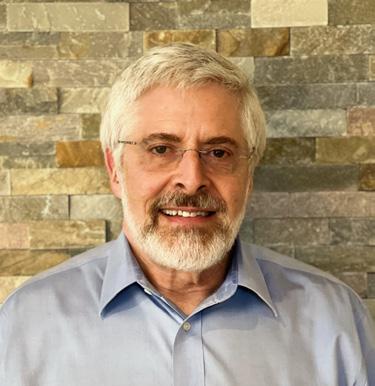
Dr. Raymond Pomm, chief medical officer for Gateway Community Services in Jacksonville received the 2023 Senator Darryl Rouson Lighting the Way Leadership Award during LSF Health Services 3rd Annual Behavioral Health Innovation Summit.
Pomm’s work in launching and managing Project Save Lives, the first hospital bridge program in Florida, was cited as among the accomplishments leading to the statewide recognition for leadership, innovation, and excellence in the field of behavioral health.
LSF Health Joins City of Jacksonville
To Launch New Mental Health Initiative
LSF Health Systems and other nonprofits joined the City of Jacksonville in kicking off Mental Health Awareness Month 2024 with a new initiative including three new programs to address the growing need for mental health resources across the First Coast.

Dr. Christine Cauffield said people often do not know where to turn when they are struggling. She believes these new programs will make a difference in breaking down barriers to access to care.
“The more we can reach out to the public, let them know the services in our community are available right now, for anyone that is struggling with mental health or substance use disorders. It’s very critical,” Cauffield said.
Mental Health Matters Jax is a three-pronged initiative that includes funding to add staff members to the local 988 Crisis Hotline.
Program helps Volusia First Responders Navigate Mental Health Challenges
A new program in Volusia County is helping first responders navigate some of the mental health challenges they face because of their careers. The Volusia Recovery Alliance has partnered with LSF Health Systems to offer the area’s First Responder Peer Support Program.
First responders are 1.4% of Florida’s workforce, yet their suicide rate is more than two times higher than the overall rate of working-age Floridians, accounting for 40.2 suicide deaths per 100,000 emergency responders. From 2017 to 2022, 247 Floridian First Responders lost their lives to suicide.
The program is for all current or former first responders. That includes firefighters, police officers, sheriffs, corrections officers, emergency medical services personnel and emergency dispatchers/ telecommunications operators.
Credit: Spectrum News 13
Dispatcher
Castellano: ‘The best part is knowing that I make a difference.’
St. Johns County dispatcher Shelly Castellano, a mother of three, says she loves her role as a 911 dispatcher, and understands the important, rewarding, impactful responsibility that she and her colleagues play in changing lives.
Castellano spoke with The St. Augustine Record as part of LSF Health Systems’ celebration of National Public Safety Telecommunicators Week.

But no matter what kind of day she has, Castellano underscored how honored she feels to perform her role as a 911 dispatcher.
Credit: St. Augustine Record
LSF Health Systems CEO Dr. Christine Cauffield speaks with media representatives about the Mental Health Matters initiative.
By The Numbers
95
organizations working with us to provide state-funded mental health and substance use programs in a 23-county region
689
at-risk children and adults served by our Care Coordination program that promotes care transitions for individuals with complex behavioral health needs.
3,500,265
individuals served by our network of contracted behavioral health organizations
649
individuals trained
394
by our Access to Care Line, a free resource that offers 24/7 screenings, referrals and information about mental health and substance use programs
228
from both civil and forensic state hospitals for individuals who are either at-risk of or have already been committed to a state hospital callers served
diversions
112
training sessions provided to community stakeholders since 2015 to become certified as either Certified Recovery Peer Specialists or Certified Recovery Support Specialists
3,348
66%
802
10
individuals trained in specialty behavioral health topics
approval rate for individuals with mental health or substance use challenges whom we helped increase access to Social Security disability benefits, this compares favorably to the national average of 65%
law enforcement calls in 2023-2024 that included mental health co-responders through programs we fund that diverted 70% of individuals from jail into treatment
community partners certified to deliver Applied Suicide Intervention Skills Training of Trainers
Funding Total
$281,310,897
DCF SAMH Total
$274,842,777
including carry forward
OTHER FUNDING TOTAL
$2,384,092
$3,723,559
STATE GRANTS/LOCAL MATCH TOTAL
DCF First Responder, COPS, Hernando Drug Court, CJMHSA Hernando
FEDERAL GRANTS TOTAL HRSA OIFSP, SAMHSA COACHES, SBIRT SETS, ZERO SUICIDE, TREE
$292,584 MANAGED CARE FUNDED PROGRAMS Fla Blue Care Program for SMI; Simply Healthcare IPS
$60,694 SPONSORSHIPS AND CONTRIBUTIONS TOTAL
$7,191 TRAININGS TOTAL
Children’s Substance Abuse
Surpassing Goals
REDUCED RECIDIVISM
of adults enrolled in care coordination who were admitted into a crisis stabilization unit/inpatient or inpatient detoxification were readmitted within 30 days after discharge. 1%
LIVING
IN A STABLE HOUSING ENVIRONMENT
of adults with severe and persistent mental illnesses live in a stable environment of adults in forensic involvement live in a stable housing environment Goal 85% Goal 64% 92% 91%
ADULT SUBSTANCE ABUSE
CHILDREN’S MENTAL HEALTH
ADULT MENTAL HEALTH CHILDREN’S SUBSTANCE ABUSE
of children served for mental health lived in a stable housing environment
of adults with substance abuse lived in stable housing at time of discharge of children with substance abuse lived in stable housing at time of discharge
Surpassing Goals
CONTRACTED NETWORK SERVICE PROVIDER AGENCIES
• Ability Housing of Northeast Florida
• Alachua County Board of County Commissioners d/b/a Alachua County Fire Rescue, Alachua County Court Services
• Aware Recovery Care
• Baker County Board of County Commissioners
• Bay Area Youth Services dba BAYS Florida
• BayCare Behavioral Health
• Bethany Christian Services
• Bradford County Board of County Commissioners
• Camelot Community Care
• CDS Family and Behavioral Health Services
• Child Guidance Center
• Children’s Home Society of Florida
• Citrus County Children’s Advocacy Center, Inc. dba Jessie’s Place
• Citrus County Sheriff’s Office
• Citrus County, Florida for and on behalf of Citrus County Fire Rescue
• City of Jacksonville dba Jacksonville Fire and Rescue Department
• City of Ocala
• Clay Behavioral Health Center
• Clay County Board of County Commissioners for and on behalf of Clay County Fire Rescue
• Columbia County Board of County Commissioners
• Community Coalition Alliance
• Community Rehabilitation Center
• CRC Health Treatment Clinics, dba Volusia County Comprehensive Treatment Center
• Daniel Memorial
• DaySpring Village
• Delores Barr Weaver Policy Center
• Dixie County Board of County Commissioners
• Eckerd Youth Alternatives
• El-Beth-El Development Center
• EPIC Community Services
• Flagler Cares, Inc.
• Flagler Hospital
• Flagler Open Arms Recovery Services
• Florida Department of Health in Citrus County
• Fresh Ministries
• Gainesville Opportunity Center
• Gateway Community Services
• Gilchrist County Board of County Commissioners
• Gulf Coast Jewish Family and Community Services
• Halifax Hospital Medical Center
• Hamilton County Board of County Commissioners
*List as of 12/05/2024
• Hanley Center Foundation, Inc.
• Here Tomorrow
• Hernando Community Coalition
• Hernando County Board of County Commissioners
• I.M. Sulzbacher Center for the Homeless, Inc.
• Inspire to Rise
• LifeStream Behavioral Center
• Living Hope
• Marion County Board of County Commissioners dba Marion County Fire Rescue
• Marion Senior Services
• Marlyn Behavioral Health System, dba Quality Resource Center
• Mental Health America of East Central Florida
• Mental Health Resource Center
• Meridian Behavioral Healthcare
• Mid Florida Homeless Coalition
• Mr and Ms Mentoring
• NAMI Hernando
• NAMI Jacksonville
• Nassau County Mental Health, Alcoholism & Drug Council, dba Starting Point Behavioral Healthcare
• Northwest Behavioral Health Services
• Operation PAR
• Outreach Community Care Network
• Partnership for Strong Families, Inc.
• Premier Community HealthCare Group
• Project Health, Inc., dba Langley Health Services
• Putnam County Board of County Commissioners
• radKIDS, Inc.
• Rebel Recovery Florida
• Recovery Point Palatka
• ReNew Recovery Café
• School District of Clay County - SEDNET
• SMA Healthcare
• SMA Healthcare, fka The Centers
• St. Augustine Youth Services
• Suwannee County Board of County Commissioners
• The Chrysalis Center, dba Chrysalis Health
• The City of Daytona Beach, Florida dba Daytona Beach Fire Department
• The House Next Door, Inc.
• The LJD Jewish Family & Community Services
• The Ora Clubhouse, Inc. f/k/a National Alliance on Mental Illness of Marion County
• The Volusia/Flagler County Coalition for the Homeless
• Union County Board of County Commissioners
• United Way of Northeast Florida
• United Way of Suwannee Valley
• University of Florida Board of Trustees
• Urban Jacksonville, dba Aging True
• Van Gogh’s Palette, dba Vincent House
• Volunteers of America of Florida
• Volusia Recovery Alliance
• Zero Hour Life Center
FUNDERS & GRANTORS
• State of Florida, Department of Children and Families
• Substance Abuse and Mental Health Services Administration
• Health Resources & Services Administration
• Changing Homelessness
• Nassau County Schools
INNOVATION SUMMIT SPONSORS
• State of Florida, Department of Children and Families
• Psych HUB
• Florida Blue
• Addiction Abatement & Innova Pharmaceuticals
• Genoa HealthCare
• MTM Services
• Knight Software
• Daigle Creative
• Well Florida Council
• USI
• Nona Scientific
• ACE Medical
• CROP Creative Media
• Sunshine Health
• Health-Tech Consultants
• Humana
• Stabilify
• Peggy Schiffers

